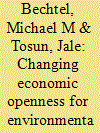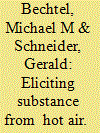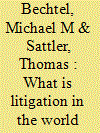| Srl | Item |
| 1 |
ID:
092336


|
|
|
|
|
| Publication |
2009.
|
| Summary/Abstract |
Citizens' concerns about (international) environmental protection standards are of increasing importance to governments in industrially advanced, high-regulating countries. In almost any proposal for a trade agreement, countries with low environmental regulation standards are required to introduce higher policy standards in exchange for high-regulating countries dismantling their trade barriers and granting access to their domestic markets. Low-regulating countries often act as required and introduce legislation aimed at reducing pollution. This leads to declaratory or de jure policy convergence. But such legislative action is not always associated with de facto or actual policy convergence, since policies are not always enforced. To analyze the strategic aspect of this potential "slippage," we set up a game-theoretic model with imperfect information. In the model, a high-regulating and a low-regulating country negotiate a bilateral free trade agreement with environmental provisions. We show how potential gains from trade, policy enforcement, and reputation costs, as well as domestic demands for environmental protection affect the occurrence of environmental policy convergence through conditional trade agreements. This study thereby advances our understanding of the relationship between bilateral trade and convergence of environmental policies.
|
|
|
|
|
|
|
|
|
|
|
|
|
|
|
|
| 2 |
ID:
095022


|
|
|
|
|
| Publication |
2010.
|
| Summary/Abstract |
The results of deliberations in multilateral fora are often considered ineffective. Decision making in the European Union (EU) and in particular its key intergovernmental body, the European Council, poses no exception. Especially in the domain of EU foreign and security affairs, the unanimity requirement governing this institution allegedly allows nationalist governments to torpedo any attempt to build up a credible European defense force and a unified foreign policy stance. In this article, we take issue with the claim that multilateral summits merely result in "hot air" by looking at whether and how decisions made during EU summit meetings affect the European defense industry. We argue that investors react positively to a successful strengthening of Europe's military component-a vital part of the intensified cooperation within the European Security and Defense Policy (ESDP)-since such decisions increase the demand for military products and raise the expected profits in the European defense industry. Our findings lend empirical support to the view that financial markets indeed evaluate the substance of European Council meetings and react positively to those summit decisions that consolidate EU military capabilities and the ESDP. Each of the substantial council decisions studied increased the value of the European defense sector by about 4 billion euros on average. This shows that multilateral decisions can have considerable economic and financial repercussions.
|
|
|
|
|
|
|
|
|
|
|
|
|
|
|
|
| 3 |
ID:
139800


|
|
|
|
|
| Summary/Abstract |
Conventional wisdom holds that the creation of international, court-like institutions helps countries to peacefully settle trade conflicts, thereby enhancing overall welfare. Many have argued, however, that these institutions remain ultimately ineffective because they merely reflect the distribution of power in the anarchic international system. We argue that international litigation provides economic spillovers that create opportunities for judicial free-riding and explore empirically how litigation in the World Trade Organization affects bilateral trade between countries involved in a trade dispute. We use a matching approach to compare the dynamics of trade flows between countries that experienced a panel ruling with trade relations of observably similar country pairs that did not experience a ruling. Based on this comparison we find that sectoral exports from complainant countries to the defendant increase by about $7.7 billion in the three years after a panel ruling. However, countries that have proactively filed a complaint and carried the main costs of litigation do not systematically gain more than less-active third parties that merely joined an existing trade dispute. This suggests that international judicial institutions can provide positive economic externalities and may thereby lead to a less power-based distribution of the gains from trade.
|
|
|
|
|
|
|
|
|
|
|
|
|
|
|
|